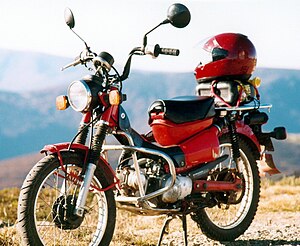Honda CT110
 | |
| Manufacturer | Honda |
|---|---|
| Also called | 'Postie bike' In Australia and New Zealand |
| Production | 1980 - present |
| Assembly | Japan |
| Class | Dual-sport motorcycle |
| Engine | 105 cc air-cooled single-cylinder SOHC 2 valve |
| Bore / stroke | 52 mm × 50 mm (2.0 in × 2.0 in) |
| Compression ratio | 8.5:1 |
| Top speed | 50 mph (80 km/h) |
| Power | 7.5 hp (6 kW; 8 PS) |
| Torque | 6.2 lb⋅ft (8 N⋅m) |
| Ignition type | Contact breaker |
| Transmission | Semi-Automatic Centrifugal clutch four-speed, with or without a dual range sub-transmission |
| Brakes | Single drums front and rear |
| Wheelbase | 1.220 m |
| Dimensions | L: 1.905 m W: 0.755 m H: 1.060 m |
| Seat height | 29 in (740 mm) |
| Weight | 87 kg (192 lb) (dry) 92 kg (203 lb) (wet) |
| Fuel capacity | 5.5 l (1.452 g) |
| Fuel consumption | 60 km/l (1.6 litres per 100 km) @ 50 km/h (140 mpg @ 31.1 mph) |
| Turning radius | 1.8 m |
| Related | Honda CT90 (Predecessor) |
The Honda CT110 is a small dual-sport motorcycle manufactured by Honda in Japan from 1980 to the present day and is sold in various parts of the world. The bike has sold well worldwide[1] and has a faithful following to this day.[2]
The CT110 replaced the CT90, which was essentially the same machine but with a smaller displacement engine.
Features


The CT110 in its classic form has a 105cc 4-stroke air-cooled single-cylinder engine which is nearly horizontal in the step-through tube/stamping frame. It also has a Semi-automatic four-speed transmission and a Centrifugal clutch. That coupled with a 2:1 ratio gear reduction box known as the dual range sub-transmission, which switched into operation using a small lever under the transmission case, allowed the bike to climb steep slopes with no difficulty.
CT110s are well regarded for their extreme reliability, economy and ease of operation. The clutchless four speed transmission does not require a clutch lever. In Australia and New Zealand the freeing of the left hand of the rider makes mail delivery easier for postal workers, or "posties".
North America
In the United States the CT110 comes with factory street legal lighting and mirrors, a large luggage rack, center stand, and an auxiliary gas can. The 1980 model of CT110 lacked the dual range sub-transmission, but that feature returned in following years. The motorcycle was imported from 1980 to 1986.
Australia / New Zealand
The CT110 is still in production and sold in other countries around the world, most notably Australia and New Zealand, where it is known as a "Postie Bike" due to its use by Australia Post and New Zealand Post as a delivery bike, without the dual range sub-transmission. In Australia this also makes them the highest selling motorcycle in the country.
A slightly modified version, the CT110 AG, is sold for agricultural use. The CT110AG has recently become road-registerable in Australia (2009), and has been road registerable in New Zealand for some time.
After almost 30 years of only being available via second-hand sale from Australia Post in bulk lots, Honda began selling the road-registerable model to the domestic market in July 2009.[3]
Apart from the Australian market, large numbers of CT110 and CT90 models were also brought to Tanzania in east Africa, where many are still in use today. Among the original users was Danish aid organisation Danida. During the late 1970s and 1980s they were the standard issue motorcycle for volunteers.
See also
- Mail carrier (known as a "Postie" in Australia and New Zealand)
- Honda CT series bikes: Trail Cub / Hunter Cub
References
This article includes a list of general references, but it lacks sufficient corresponding inline citations. (October 2009) |
- 1981 Honda CT110 Hunter Cub infobox specifications from these pages on 2008-03-01:
